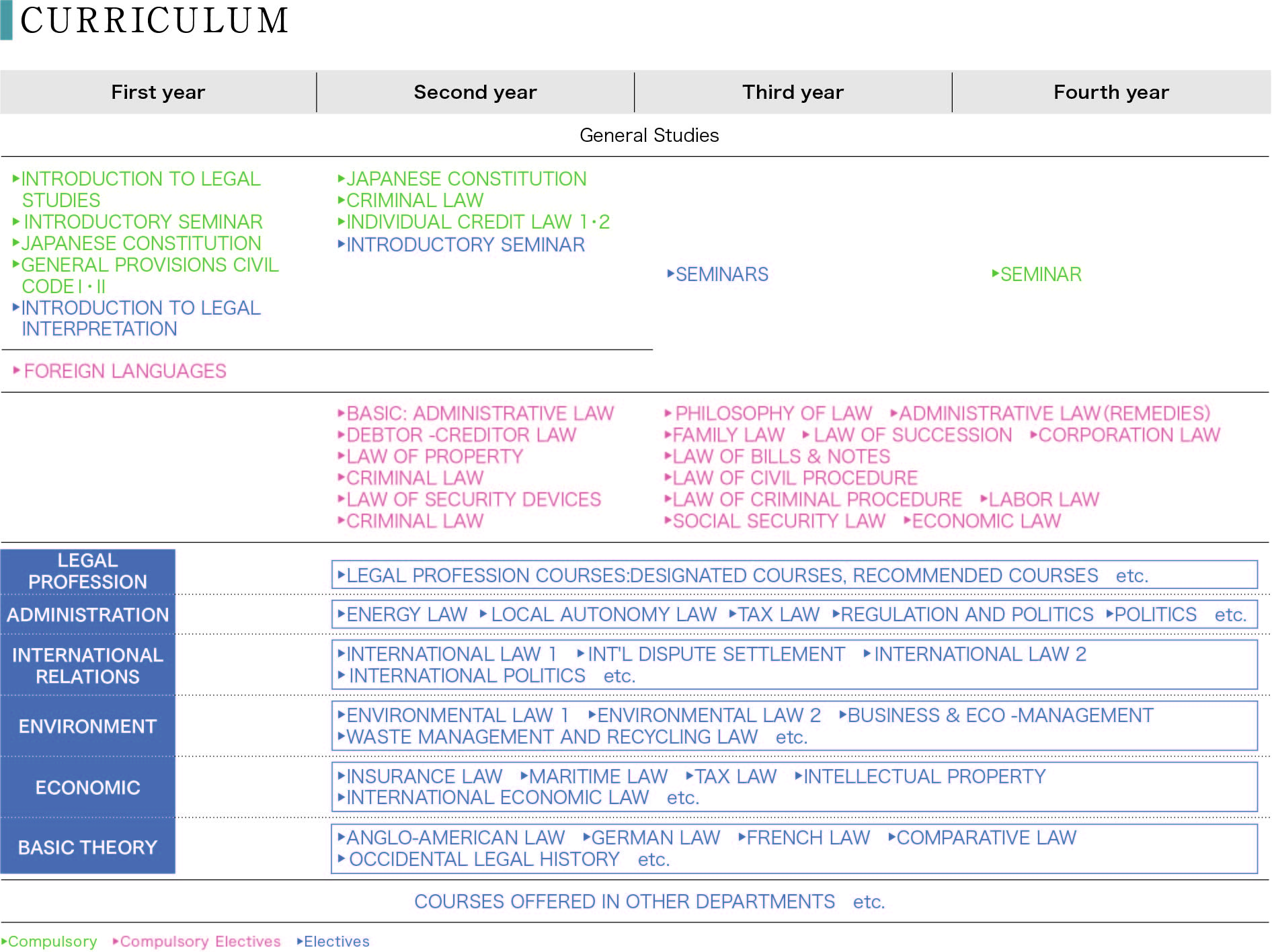Department of Law


Department Features
In today’s world where people’s values are diversifying and their society is facing rapid changes, various issues are emerging on a global scale as a result of economic and information globalization and growing concerns about the environment. What the world needs in these times of change and challenges are ways to balance interests and identify problems that are unique to jurisprudence. The Department of Law develops not only legal knowledge but also social coordination skills in order to become a legal expert who can play an active role in solving new problems. Studying law is much more than just memorizing the words on legal documents. Instead, the program emphasizes problem-solving skills based on legal thinking, examines the economic environment and social consciousness behind disputes, and considers the significance and limitations of legal theories.
Curriculum
In addition to the basic subjects The Japanese Constitution, Civil Law, and Criminal Law, the program offers a full range of related subjects such as politics, international relations, and environmental issues. Students will develop basic concepts of jurisprudence and acquire the ability to fully understand and rationally resolve conflicting interests and arguments on today’s legal issues. Examples include, organ transplants upon the brain-death of donors and dual surnames. In the first year, students study The Japanese Constitution, focusing on basic human rights, and Civil Law to consider legal issues in civil life. In the second year, students study The Japanese Constitution, Law of Obligations, Criminal Law, and other required courses to learn the governance structure and the course model. In the third year, students take a variety of elective courses, and in the Seminar in the fourth year, they hone their research, presentation, and discussion skills by making full use of the knowledge they have acquired up to that point.
as of 2022
* Please refer to the syllabus for more information on the courses.
Course Examples
- Japanese Constitution
Students will learn about the governing structure of the Japanese Constitution (Courts, Diet, Cabinet, the Emperor, local government, and the people) based on important precedents and theories. The course also explores the significance of modern Japanese Constitutionalism to constrain the power of the modern state, the design of the governing structure and modern Japanese Constitutionalism, and the design and importance of the governing structure.
- Law of Civil Procedure I
Students will learn the process from the perspective of a party involved in a civil dispute, such as lending or borrowing money, vacating a house or land, or getting a divorce, to filing a lawsuit, arguing and proving claims at oral argument, and reaching a settlement or judgment.
- Criminal Law
Criminal law studies is a field that defines determining factors of a criminal act and its punishment. We will examine each individual type of crime to determine what type of conduct should be punished and to what extent. Representative precedents and theories from the past will also be covered.
- General Provisions Civil Code I, II
As an introduction to civil law, this course provides an overview of its history, basic principles, and property law as a whole. The basic concepts of person, property, legal acts, agency, juridical person, and statute of limitations will be explained in order, and students deepen their understanding by using the Six Codes.
- Individual Credit Law I
This course explains the basic rules of civil law dealing with “contracts”. In the general theory, students will learn about the formation of contracts, the right of concurrent execution defense, the sharing of risk, and cancellation of contracts, while each theory addresses specific contracts such as buying and selling, leasing, and subcontracting.
- Corporation Law I
Corporate law is a set of rules governing the organization and operation of companies, which are the entities of business activity that utilize the legal form of a corporation. This course is an entry-level course and deals with the general rules, shares, and institutions.
Available Teaching Licenses and Subjects
Law students are not eligible to take teaching courses.
Curatorial courses are available.
Educational Objectives and Policies
-
To develop problem-solving skills, a fundamental understandings of jurisprudence, with an emphasis on the basic structure of legal decision-making frameworks and the relationship between the real world and the legal system.
-
To train personnel with the ability to think legally so that they can acquire and utilize methods of adjusting interests and discovering problems specific to jurisprudence.
-
The Department has established the following abilities and knowledge that students should have at the time of graduation, with the aim of nurturing individuals who strives to achieve the rule of law and a fair society. Upon completion of graduation requirements, students are recognized as having mastered these requirements and are awarded a degree.
- Ability to comprehensively and multilaterally examine various issues in society from a legal perspective
- Ability to make recommendations that contribute to legal solutions to various problems in society
- Ability to apply legal frameworks to a variety of real-world problems
-
The Department organizes its curriculum in accordance with the Diploma Policy as follows
- Lectures on Japanese Constitutional Law, Civil Law, Criminal Law, and other substantive law (basic legal subjects/compulsory courses), to install a legal framework in a thought process and to develop the ability to examine social issues using this framework, which form the foundation of jurisprudence.
- Wider range of other substantive law subjects, basic law subjects, and neighboring subjects will be arranged as elective required subjects or elective subjects, to enhance the ability to form a logical answer for legal problems.
- Small-group seminars in the fourth year (or as an elective course in the third year or motivated students), to cultivate the ability to apply the legal framework to various problems that arise in society.
-
Our department cultivates the ability to think and conceptualize (so-called “legal mind”) that contributes to the legal resolution of disputes and problems in real society. Therefore, the students with following qualities will be accepted.
- Students with a high interest in society and the people
- Students with a flexible and broad interest in the social sciences in general and in international affairs in particular.
- Students who not only have the above interests but also can think with flexibility utilizing their prior education.
Faculty Members
Akiko ANZAI Professor
Yu UMEMURA Professor
Mayumi OHASHI Professor
Kaori HABU Professor
Akio ZENTO Associate Professor
Masaaki MIZOBUCHI Associate Professor
